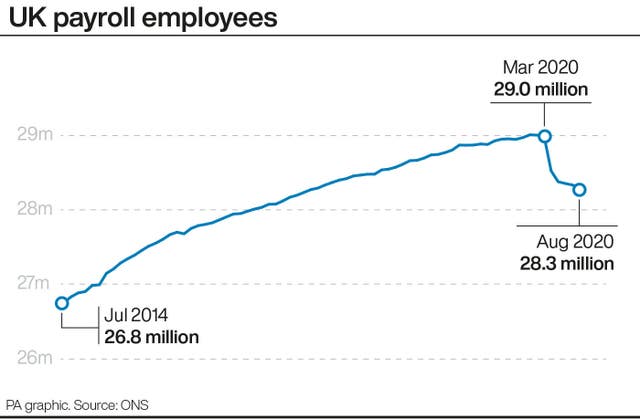
Clive Bull 1am - 4am
16 September 2020, 16:14

The Government’s key strand of support for businesses and their staff is set to end on October 31.
The Government’s Coronavirus Jobs Retention Scheme will come to an end on October 31.
The scheme was set up to support jobs during the Covid-19 pandemic, with the Government promising to cover 80% of an employee’s salary, up to a maximum of £2,500 per month, if that person’s place of work was unable to remain open during lockdown or needed to scale back.
The scheme was introduced on April 20 and according to the latest statistics which were published a month ago, 1.3 million businesses have claimed £35.4 billion to pay 9.6 million employees.
But furlough has been slowly scaled back in recent weeks. During September employers have been forced to pick up 10% of the tab, and they will have to pay 20% of their staff’s wages in October.
Here are the key questions surrounding the future of the scheme:
Will I still get paid by my employer?
If you are still in full-time employment on November 1, you will continue to be paid in the same way as before and unless you have agreed otherwise with your employer you should be back to your usual pay.

However, workers who get paid per hour they work will only get paid if they go back to work, meaning zero-hours contracts workers whose employers are still closed, or have reduced capacity, are likely to lose out.
Why is 45 days important?
It is now 45 days until the scheme runs out, meaning employers will then have to pick up the full bill for their staff’s salaries. Many are likely to be forced into tough decisions because they are simply unable to pay out, meaning some staff may be made redundant.
This week is important because any employer planning to lay off more than 100 workers needs to open a consultation at least 45 days before any dismissals take effect. Businesses laying off between 20 and 99 people need to give 30 days’ notice.
Will the Government extend the scheme?
The Government has been very clear that the furlough scheme will come to an end on October 31, despite many experts and the Labour Party calling on the payments to continue for at least some of the most vulnerable sectors.
Many are worried bringing the scheme to a close for all employers could lead to a massive amount of redundancies.
However, the Treasury is hopeful some of the worst could be offset by the promise of a jobs retention bonus. It will pay employers £1,000 for each furloughed employee that is still on the books by the end of January next year. It hopes that this will give businesses an incentive not to lay off thousands of workers.

The response to the Covid-19 crisis has been very different in other countries. Some governments, such as in the US, have simply handed cash to their citizens, others have supported businesses.
Germany has long had a system in place which saves jobs during downturns, with struggling businesses able to ask the government to support up to 60% of their salaries for six months. During Covid-19, this has been expanded to 80% for 21 months.
France has a similar system where companies can slash the number of hours its staff work and ask the government to pick up part of the tab for the employee’s lost income.
The UK scheme has proven much more costly than its European equivalents.
Will millions of people lose their jobs?
It is impossible to predict the full impact of the end of the furlough scheme. Many have warned furlough has been hiding a redundancy time-bomb, with thousands of employees still being paid by businesses that will not be able to survive, or will need to cut back, in November when they are no longer propped up by the Treasury.
Len McCluskey, general secretary of the trade union Unite, warned Prime Minister Boris Johnson on Wednesday that closing the scheme could “open the floodgates for redundancy”.
He added: “There is little doubt that an extension to the Coronavirus Job Retention Scheme is critical and a subsequent sector-specific scheme should follow.”